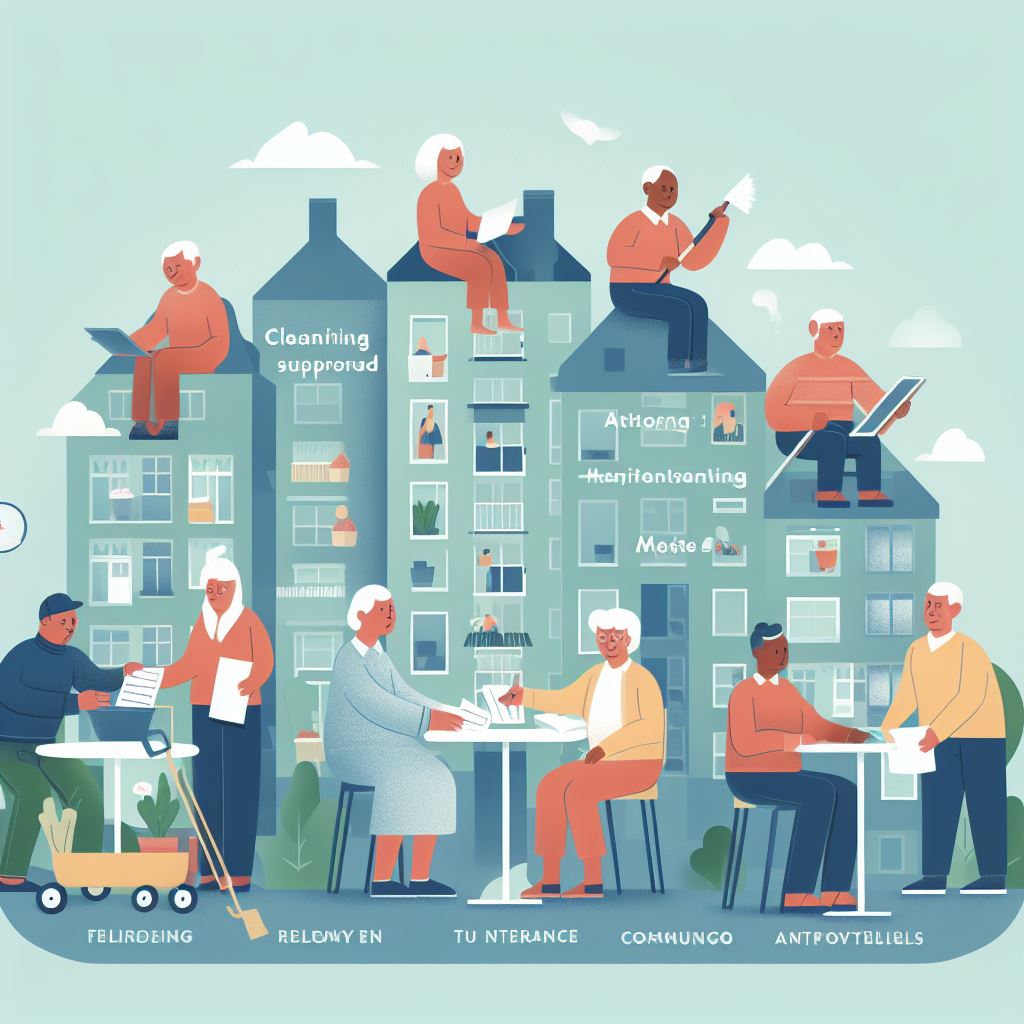Comprehensive Guide: Tenant Duties in Subsidized Housing

Are you ready to become the ultimate tenant in subsidized housing?
Get ready to dive into our comprehensive guide that will equip you with all the knowledge and tools you need.
From understanding your rental agreement and lease terms to maintaining your housing unit and complying with community rules, we’ve got you covered.
Say goodbye to confusion and hello to a smooth and successful tenancy.
Let’s get started!
Key Takeaways
- Eligibility requirements for subsidized housing tenants include income limits, U.S. citizenship or eligible immigration status, and potentially criteria related to age, disability, or family composition.
- It is important to review and understand the terms of the rental agreement and lease before signing, including the duration of the lease, rent amount, and additional fees.
- Timely rent payments are crucial, as late payments can result in fees, negative rental history, or eviction. It is important to know the due date and payment method outlined in the rental agreement.
- Maintaining and repairing the subsidized housing unit is essential, including regular cleaning, reporting maintenance issues promptly, and using appliances properly.
Eligibility Requirements for Subsidized Housing Tenants
To be eligible for subsidized housing, you must meet certain requirements. The primary requirement is that your income falls within the specified limits set by the housing authority. These limits are based on the area’s median income and are designed to ensure that those with lower incomes have access to affordable housing. Additionally, you must be a U.S. citizen or have eligible immigration status. Some housing programs may also have specific criteria related to age, disability, or family composition. It’s important to note that eligibility requirements may vary between different subsidized housing programs, so it’s crucial to review the specific guidelines for the program you’re interested in. Understanding and meeting these requirements is essential to securing subsidized housing and obtaining the benefits it offers.
Now that you have a basic understanding of the eligibility requirements for subsidized housing, it’s important to delve into the next crucial aspect: understanding the rental agreement and lease terms. This section will provide you with valuable information on the rights and responsibilities you have as a tenant, as well as how to navigate the terms and conditions of your lease agreement. By familiarizing yourself with these aspects, you can ensure a smooth and successful tenancy in subsidized housing.
Understanding the Rental Agreement and Lease Terms
Once you have been approved for subsidized housing, it’s important for you to understand the rental agreement and lease terms. This document outlines the rights and responsibilities of both you, as the tenant, and the landlord. It’s essential to carefully review and comprehend the terms before signing the agreement.
The rental agreement will specify important details such as the duration of the lease, the amount of rent, and any additional fees or charges. It will also outline the conditions for terminating the lease, as well as any policies regarding maintenance and repairs. Understanding these terms will help you navigate your tenancy and ensure that you’re aware of your rights and obligations.
Additionally, the lease terms may include information about the use of the property, such as restrictions on subleasing or pets. It’s crucial to comply with these terms to avoid any potential conflicts or breaches of contract.
By familiarizing yourself with the rental agreement and lease terms, you can effectively advocate for your rights as a tenant and ensure a smooth and respectful relationship with your landlord. Understanding these terms will also help you fulfill your responsibilities, such as paying rent on time and maintaining the property.
Speaking of which, let’s now discuss your responsibilities for paying rent on time.
Responsibilities for Paying Rent on Time
Make sure you prioritize timely rent payments as your primary responsibility as a tenant in subsidized housing. Paying your rent on time is crucial for maintaining a positive relationship with your landlord and ensuring the stability of your housing situation. By fulfilling this responsibility, you not only demonstrate your commitment to the terms of your lease agreement but also contribute to the overall sustainability of the subsidized housing program.
Late rent payments can have serious consequences, such as late fees, negative rental history, and even eviction. It’s essential to understand the specific due date and payment method outlined in your rental agreement. Set reminders or establish automatic payments to help you stay on track and avoid any unnecessary financial burdens.
If you’re facing difficulties in paying your rent on time, don’t hesitate to reach out to your landlord or housing authority. They may be able to provide assistance or work out a payment plan that suits your needs. It’s important to communicate openly and proactively to find a solution rather than avoiding the issue, which could lead to more significant problems down the line.
Maintaining and Repairing Your Subsidized Housing Unit
When living in subsidized housing, you play a crucial role in maintaining and repairing your housing unit. As a tenant, it’s important to understand your responsibilities and take proactive steps to ensure the upkeep and functionality of your home.
Here are five key items to consider:
- Regular Cleaning: Keep your unit clean and tidy to prevent the buildup of dirt and grime. Regularly vacuum, dust, and mop the floors, clean the bathroom and kitchen, and take out the trash to maintain a healthy living environment.
- Reporting Maintenance Issues: Promptly report any maintenance issues or repairs needed to the housing authority or property management. This includes problems with plumbing, electrical, heating, or any other structural issues that may arise.
- Preventative Maintenance: Take preventive measures to avoid potential problems. This includes changing air filters regularly, testing smoke detectors, and ensuring proper ventilation to prevent mold and mildew growth.
- Responsible Storage: Store your belongings in a safe and organized manner to prevent damage to the unit or create hazards. Avoid cluttering common areas and keep personal items secure.
- Respectful Use of Appliances: Use appliances properly and follow the manufacturer’s instructions to prevent damage and ensure their longevity. This includes avoiding overloading washing machines and dryers, not leaving stovetops unattended, and properly maintaining refrigerators and ovens.
Compliance With Community Rules and Regulations
How can you ensure compliance with community rules and regulations in subsidized housing? It is important to understand and follow the rules and regulations set by the community when living in subsidized housing. This ensures a harmonious living environment for all residents and helps maintain the integrity of the program. Here are some key ways to ensure compliance:
| Action | Description | Benefits |
|---|---|---|
| Attend community meetings | Actively participate in community meetings and stay informed about any changes or updates to the rules and regulations. | Stay up-to-date and have a say in decision-making processes that affect the community. |
| Read and understand the lease agreement | Thoroughly review the lease agreement to understand your rights and responsibilities as a tenant. | Avoid any violations or misunderstandings that may lead to penalties or eviction. |
| Report violations | If you witness any violations of the community rules, report them to the property management immediately. | Help maintain a safe and respectful living environment for all residents. |
Frequently Asked Questions
What Documents Do I Need to Provide to Prove My Eligibility for Subsidized Housing?
To prove your eligibility for subsidized housing, you’ll need to provide certain documents. These may include proof of income, identification, and any necessary paperwork from government assistance programs. Make sure to have everything ready to streamline the application process.
Can I Make Modifications to My Subsidized Housing Unit, Such as Painting the Walls or Installing New Fixtures?
You have the freedom to personalize your subsidized housing unit, like adding a splash of color or upgrading fixtures. However, be mindful of any restrictions outlined in your lease agreement.
Are There Any Penalties for Late Rent Payments in Subsidized Housing?
Late rent payments in subsidized housing may result in penalties. It is important to review your lease agreement to understand the specific consequences. Timely payment ensures a smooth tenancy and helps maintain positive relationships with your landlord.
Who Is Responsible for Covering the Cost of Repairs in My Subsidized Housing Unit?
You are responsible for covering the cost of repairs in your subsidized housing unit. It is important to report any damages or issues promptly to your landlord or housing agency to ensure they are addressed in a timely manner.
What Happens if I Violate a Community Rule or Regulation in Subsidized Housing?
If you violate a community rule or regulation in subsidized housing, you may face consequences such as warnings, fines, or even eviction. It’s important to familiarize yourself with the rules and follow them to avoid any disruptions to your housing.



